Iran, Oman Hold Meeting On Joint Regional Strategy
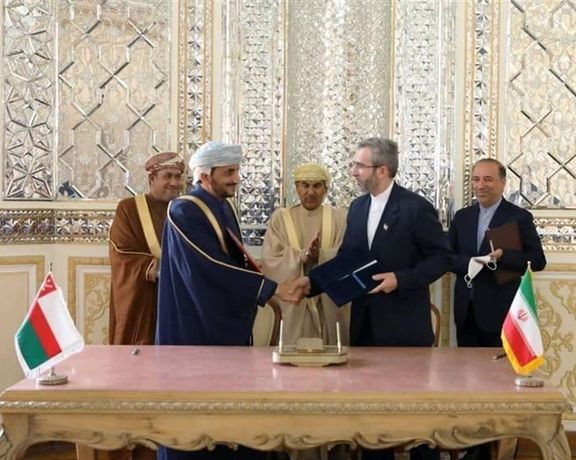
Iranian and Omani diplomats have held the eighth meeting of their Joint Strategic Consultation Committee to discuss issues of mutual interest in the region.

Iranian and Omani diplomats have held the eighth meeting of their Joint Strategic Consultation Committee to discuss issues of mutual interest in the region.
Iranian Deputy Foreign Minister for Political Affairs Ali Bagheri-Kani hosted his Omani counterpart, Sheikh Khalifa bin Ali bin Issa al-Harthy, in Tehran on Sunday.
During the meeting, Bagheri pointed to the 50th anniversary of the establishment of mutual relations and called for more efforts to further boost bilateral ties.
He stressed that regional issues should be resolved only by the countries of the region through dialogue.
They also talked about the negotiations over Iran’s nuclear program as well as the crisis in Yemen.
For his part, the Omani under-secretary for diplomatic affairs expressed interest in expanding relations with the Islamic Republic, noting that peace and tranquility in the region are achieved only through peaceful means.
He added that Iranian and Omani ties have influence in the region and beyond.
The visiting Omani official also met with Iranian Foreign Minister Hossein Amir-Abdollahian on Saturday.
The Joint Strategic Consultation Committee was formed with the aim of improving the level of negotiations and drawing a roadmap for all spheres of the Tehran-Muscat relations.
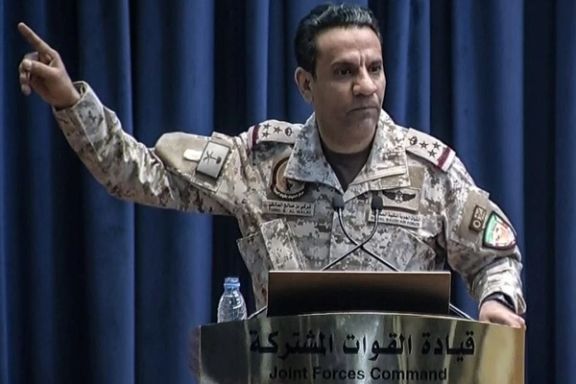
The Saudi-led coalition fighting in Yemen said on Sunday that Iran-backed Lebanese Hezbollah has been training the Houthi rebel forces, including launching armed drones against Saudi Arabia.
Iran-aligned Houthi group had fired 430 ballistic missiles and 851 armed drones at Saudi Arabia since the war started in 2015, killing 59 Saudi civilians, the spokesman for the coalition said.
General Turki al-Malki, said the Iran-aligned movement had been using Sanaa airport as a base to launch attacks on the kingdom, an allegation the Houthis deny. But he shared videos of Hezbollah members training Houthi forces.
Al-Malki said, “The Houthis do not have the ability to make the decision to be part of the political solution in Yemen.” He blamed Iran of spreading sectarian conflict in the region.
Yemen has been mired in violence since 2014 when the Houthis took over the capital Sanaa and ousted the internationally recognized government of Abd-Rabbu Mansour Hadi. Saudi Arabia and the United Arab Emirates intervened against the Houthi movement in 2015 but the war has stalemated for years, killing tens of thousands of Yemenis, mostly civilians.
The conflict is largely seen as another proxy war between Middle East archrivals Saudi Arabia and Iran.
With reporting by Reuters
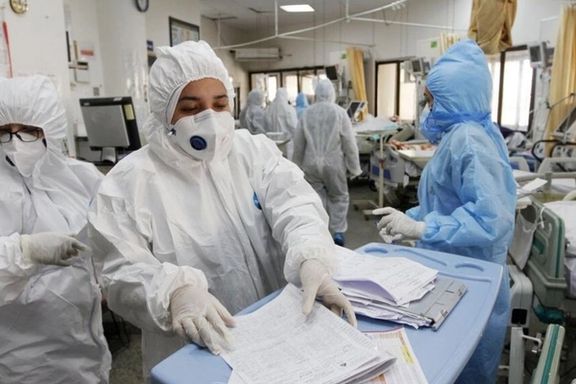
While Iran says the number of people carrying the highly infectious Omicron variant of the coronavirus is increasing, government travel restrictions seem patchy.
Public relations manager of the Iranian Health Ministry, Mohammad Hashemi, said on Sunday that 14 people are confirmed to be infected with Omicron in several parts of the country.
The number of people with the new variant is probably much higher than 14 because Iranian authorities in the past have been slow in announcing outbreaks. The head of the Medical Sciences University of Semnan province, Kamran Qods, talked about a family of five who caught the virus in less than a day, a case that the government has not reported, as an example for the high rate of Omicron’s contagion.
Iran was the second country after China where the corovirus spread and Covid-19 became an epidemic, but the government was slow to admit the crisis and act to contain it in early 2020.
Iran has announced that it has closed all its land and sea borders to non-Iranians for 15 days, but air travel is still ongoing except from eight African countries and four European ones, namely England, France, Norway and Denmark.
Head of Iran's Roads and Transportation Organization Javad Hedayati said on Sunday that Iranian passengers can cross the borders with their vaccine cards and a negative PCR test.
He added that a travel ban has also been put in place for Iranian tourists who want to visit Turkey, because according to Turkish authorities Omicron accounts for 10 percent of new cases.
If that is the case in Turkey, then Iran should also have hundreds of people infected with Omicron.
However, restrictions, which started with Khuzestan province on Saturday have exempted holders of valid residence permits, student and work visas, students of seminaries and universities, as well investors and medical visas. These groups constitute the major bulk of the people who travel to and from Iran.
More than 6,000 flights have been cancelled worldwide over the Christmas weekend as pilots, flight attendants and other employees are calling in sick or having to quarantine after exposure to COVID-19.
A senior official of Iran’s national Coronavirus headquarters says the new variant will be the dominant type of Covid-19 in Iran in the following weeks, if it is not controlled.
Deputy health minister Kamal Haidari said last week that about 1,800 suspected cases were sent to laboratories for further tests.
Iran, which confirmed the first Omicron case on Sunday, December 19, is one of the worst hit countries in the Middle East by more than 131,000 deaths since February 2020.
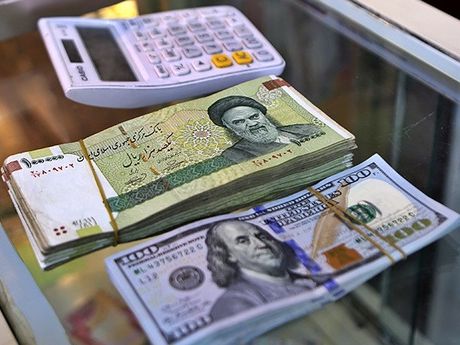
Several members of Iran’s parliament have warned that scrapping cheap government dollars for imports of essential goods can lead to even higher prices in soon.
President Ebrahim Raisi’s government has announced plans to stop providing dollars at a seven-fold cheaper exchange rate to importers of essential food staples, animal feed and possibly some medicines, as it faces a revenue crunch amid continuing US sanctions.
The special exchange rate was introduced in 2018 to control inflation when the United States pulled out of the Obama-era nuclear agreement known as JCPOA and imposed crippling sanctions on the Islamic Republic.
However, media and politicians have charged that the cheap dollars led to large-scale corruption as individuals and companies pretended to be importing essential goods while either speculating in the currency market or importing luxury goods.
It is still not clear if the government wants to completely scrap the cheap import dollars, which is essentially a subsidy or maintain support for animal feed and medicines. Prices have been rising alarmingly, leading to warnings of social unrest.
Iran is engaged in talks to resolve its nuclear dispute with the West, which would remove US sanctions, but so far months of negotiations have not led to an agreement.
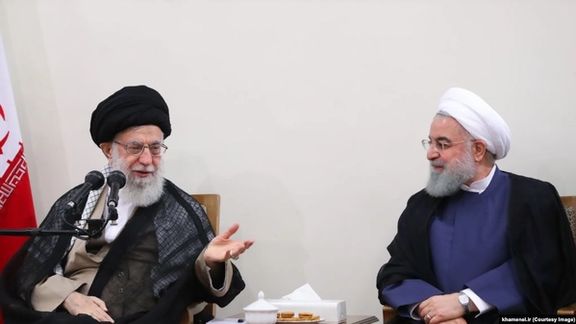
Iran’s Supreme Leader Ali Khamenei has met ex-president Hassan Rouhani, apparently for the first time since Rouhani left office August after completing his second term.
The meeting was disclosed by Mohammad Mohajeri, an editorial-board member of Khabar Online website, in a Sunday tweet. "Even if no news gets out about the content of the recent one-hour meeting of Hassan Rouhani with the Supreme Leader, the news itself bears an important message for politicians, whether [they belong to the] right, or left, or are hardliners, etc.," Mohajeri noted.
Mohajeri's tweet was immediately picked up by several publications and social-media pundits ready to pronounce the encounter a success or disappointment for Rouhani.
Some media detected a possible signal that Khamenei would appoint Rouhani to a leading position, such as chairman of the Expediency Council, a post assigned to Akbar Hashemi Rafsanjani after he stood down as president in 1997 and currently held by Sadegh Larijani, the former chief justice.
Under fire
Others saw the meeting as the leader recognizing the work of Rouhani, who has been under fire from principlists in government and parliament in recent weeks, with some parliamentarians arguing he should be put in trial.
Mohajeri did not give a date for the meeting. Javad Emam, a reformist politician, told the Iranian Labour News Agency (ILNA) that “sources close to Rouhani” had spoken of a meeting "a few weeks ago." Emam said to ILNA that the former president had told “friends” he was “very pleased with the meeting with the leader and their talks.”
Emam further suggested that the meeting − which he claimed Rouhani's critics had tried to prevent − could have related to talks in Vienna to revive Iran’s 2015 nuclear deal, the Joint Comprehensive Plan of Action (JCPOA). Rouhani regarded the agreement as the first step to a wider expansion of cooperation with European powers but was stymied when the United States left the agreement in 2018 and imposed ‘maximum pressure’ sanctions.
"The gentlemen [in power now] admit that the experiences gained from the previous talks [under Rouhani] are now being used and are very useful,” Emam said.
Drained coffers
Ali Hassanloo, editor of the reformist Eslahat Press website tweeted Sunday said Khamenei had not offered Rouhani a new position: "Firstly, Rouhani had requested the meeting with the Leader. And it wasn't a good meeting either and Mr Khamenei criticized him for the conditions in which the government was handed over [to new president Ebrahim Raisi], particularly drained government coffers. No position was on offer either although Rouhani expected to be given the chairmanship of the Expediency Council.”
There were reports that Rouhani felt “humiliated” during Khamenei’s last meeting with outgoing ministers, in July, which lasted 17 minutes during which Khamenei offered no words of thanks but spoke only of other matters such as "the goals and fundamentals of the Revolution.” Khamenei pointed out that Rouhani had erred in "investing hope in the West and trusting it,” especially in economic policy. “You lingered there and could not progress," Khamenei reportedly said.
A similar meeting with Mahmoud Ahmadinejad and his cabinet members in 2013 lasted five hours during which Khamenei praised the outgoing government, although his relations with Ahmadinejad had long been sour.
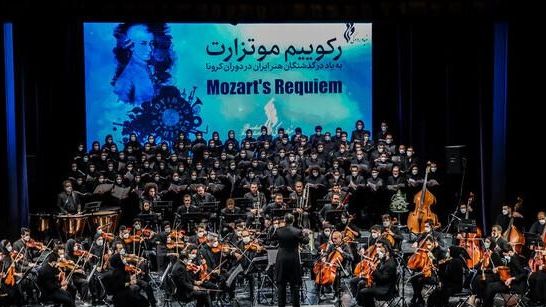
Prominent Iranian musician Hossein Alizadeh says pressure on music and musicians in Iran is incomparably higher than any other Islamic country in the world.
Alizadeh made the comments after watching a concert in Tehran’s Vahdat hall, which opened its doors to people after a 22-month hiatus due to Covid-19 restrictions.
Alizadeh highlighted that even the Taliban is gradually opening Afghanistan’s music conservatories.
He appreciated solidarity among the Iranian artists, saying, “If music is being insulted, we are all being insulted.
His criticism was apparently a reaction to recent remarks by Iranian lawmakerKazem Mousavi, who said Western musical instruments should not be allowed in an Islamic country, noting that that anyone who desired a different lifestyle should leave Iran.
According to the head of Customs Administration Iran has classified musical instruments – along with sunglasses and over a thousand other commodities -- as luxury items and banned their import.
In a meeting with Culture Minister Mohammad-Mehdi Esmaeili on Thursday, firebrand cleric Ahmad Alamolhoda criticized artists in Iranfor feeling entitled.
“They should be asked what they have done for the Islamic revolution” said the staunch supporter of Supreme Leader Ali Khamenei, who is the father-in-law of Iran's President Ebrahim Raisi.